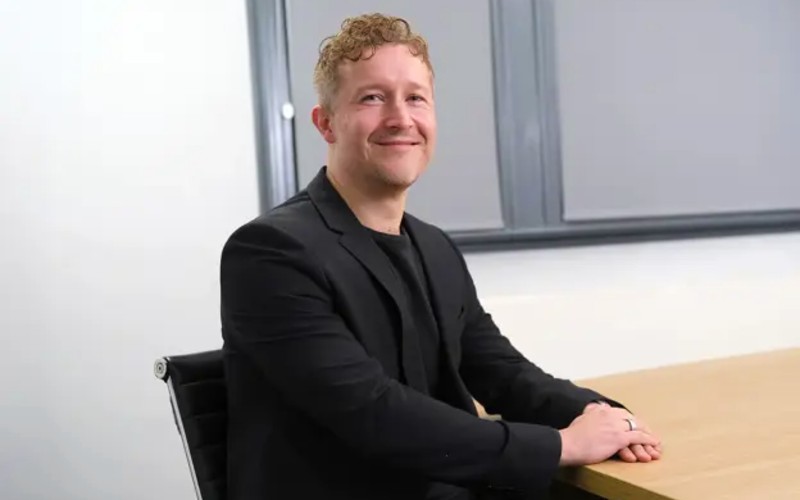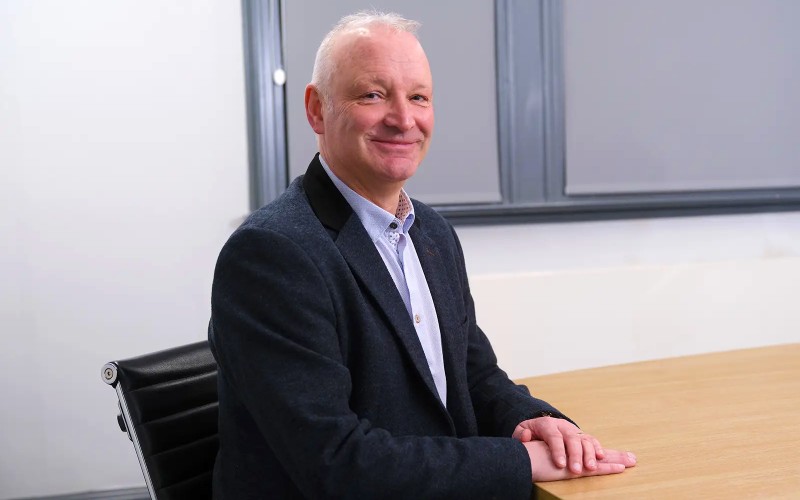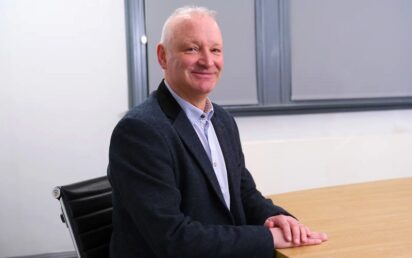S&W, one of the fastest-growing UK accountancy firms, is expanding around the North of England.
Aiming to bring the ‘personal touch’ to professional services for businesses, it builds on the strength and heritage of Smith & Williamson, which was founded in 1881.
S&W was launched as a new business earlier this year following the sale of Evelyn Partners’ professional services business to private equity firm Apax Partners. It is now looking to cement its presence in Manchester, Leeds and Newcastle, building upon successful operations in Birmingham, Bristol and London.
Manchester partner David Fort (pictured above) was at the forefront of Haines Watts’ Manchester operation for 25 years before its sale to Evelyn, which completed just a few months before the Apax deal.
“Smith & Williamson were looking for a Northern presence to complete their offer,” he tells BusinessCloud inside S&W’s Manchester office on Princess Street, formerly the base for Haines Watts.
“Evelyn’s existing offices in Leeds and Newcastle meant there was already operational cooperation across the North. And it transpired that Evelyn was looking to split its business between financial planning and accountancy.
“Apax came in and acquired Evelyn Partners’ professional services business which was, upon separation, launched as S&W.”
Sweet spot
Gary Fenemore, a tax director, spent 10 years at Mazars before joining Alvarez & Marsal then, soon afterwards, the fledgling S&W business.
“Haines Watts was a reasonably sized firm with a big network – but the range of services S&W can offer now is much, much bigger,” he explains. “Since the acquisition, several partners have come in with specialisms that I think are crucial to really service clients: such as employment taxes, transfer pricing, M&A, business rates…bringing with them all kinds of different skillsets and experiences.
“We’re always looking out for talent in the local market which, prior to the transaction, would have probably ended up at a ‘Big 4’ firm.”
S&W already has more than 1,850 employees and more than 120 partners operating from 15 towns and cities in the UK and Republic of Ireland.
Fort sees S&W’s sweet spot as those growing businesses which fall outside PIEs (public interest entities) and listed companies, but are still in need of sound planning advice.
“We think we’ve got a different offering: we’re not as restricted as the ‘Big 4’ marketplace, but we do have the resources to service expanding owner-managed businesses, as well as private equity-backed complex businesses,” he explains.
“There is a change in the marketplace and the opportunities that are out there. We are seeing a lot of people coming down from the ‘Big 4’ because they feel more in control of their own destiny; they can make an impact; they are given the support; and then they can build their own business within a business – as opposed to being a cog in a larger wheel.”
Fenemore describes the firm’s culture in more personal terms: “I had a call with a client last night while I was cooking dinner, and we talked about half a dozen things – that’s what I like.
“That little personal touch to solve a problem is something that you maybe don’t get everywhere. That’s the culture in our business.”

Fenemore (above) will speak on the breakfast panel at our FUEL Manchester 2025 event on 9th October – register to attend here – and also offer advice to 25 growing Manchester businesses in the following growth planning masterclasses.
FUEL for Manchester’s tech startups
S&W is a headline sponsor of the event at No.1 Circle Square. Technology-led businesses sit neatly into the firm’s offer – whatever stage of the lifecycle they happen to be at.
“I just like the businesses with the ambitions to try things,” says Fenemore. “As long as you’ve got ambitious leaders, and they’re trying to achieve something, there’s probably a tax angle… for example, if they are early stage, and maybe strapped for cash, you can help them incentivise staff with share schemes instead of agreeing pay rises or offer support with tax incentivised fundraising.
“As they mature, they may be looking at international markets; they may also be gearing up for an exit, so they need to make sure the structure works to facilitate that. If they spend some time now to get that right, it won’t cause issues or delays later on. We may then support them on the exit event itself.
“There’s all kinds of areas you can support businesses with, across all stages of the lifecycle – for me, that’s why it’s so important to develop a rapport and connection with the business. If you don’t have that relationship, you can’t support them in all these important areas as they grow.”
Offering an example on the advisory side – as opposed to the compliance/audit offer to bigger entities – Fort says a client of his invested in a tech startup after exiting his business.
“The startup needed accountancy and structural support. They then realised that actually the bigger market might be Ireland and then ultimately the US – so we can help them sort out the structure to facilitate that. Gary is working with them and our US network,” he explains.
“It looks quite a small business on the face of it, but the possibility is endless – and they need that support now to make sure the structure is right. We’ll ride the wave with them and see where they go.
“Sometimes the smaller clients just think they deserve our help at year-end and that’s it; but as their advisors, we should be getting close to them and educating them as to what else they need and are entitled to.”
Fenemore pointed to the wider landscape. “There is so much noise – whether it’s across tax, the wider economy, tariffs in the US – that there is no reason not to speak to your clients pretty consistently.
“We should be proactively raising these issues with them, rather than waiting for them to come to us and say: ‘I’ve got a problem. How do I solve it?’”
The funding conundrum
One of the biggest hurdles to building a successful large business is funding – securing access to capital while retaining a majority stake in the business.
“In the North, one of the challenges for business is raising the necessary funds to facilitate growth,” says Fenemore.
“The conundrum facing companies raising funds is they are often bootstrapped by their nature. And because they’re bootstrapped, one of the most obvious areas to cut costs is on professional advisor fees.
“You often see this with university spinouts: they’ve got a great idea and you can see the business will be worth tons of money down the line, but it is capital intensive, so they need cash. They’re not in a position to pay for the most comprehensive advice and this can cause issues later in the business lifecycle.
“For instance, they might appoint a high street accountant who can maybe pull together a set of accounts and provide some good compliance services. However, they don’t really seek advice on anything else at that point, because they just haven’t got the cash to do it, and a lot of smaller firms don’t have the wider advisory skillset S&W does – and can’t proactively offer input.
“I often get involved later in the lifecycle and find when asking questions around structuring or financing conditions that businesses have often found themselves in sub-optimal places because they went with the default offer or suggestion and didn’t get the necessary specialist advice to offer a counterpoint.
“They don’t have the support of an S&W or someone in their corner to say: what do we see commercially as fair? Could it be structured differently? Can we protect founders’ equity as much as possible, incentivise staff, think about our exit route before that’s on horizon – so we’re not trying to reengineer things down the line?”

Manchester central
S&W has a business outsourcing team which looks to assist early stage companies with such services, and can be provided on a cost effective basis – meaning these businesses retain access to the wider S&W advisory services. And so, despite the challenges, Fenemore remains optimistic.
“I moved to Manchester 12-13 years ago and it’s a great city to be in. There are some great funds such as Palatine, NorthEdge and BGF, and also established angel networks; it’s such a vibrant place to work,” he says.
“There are some really entrepreneurial businesses. They may be smaller than the San Francisco equivalents, and funding is a bit tougher to access; but we don’t want Manchester to be San Francisco. And we especially don’t want its hurricanes and earthquakes!”
Both Fenemore and Fort are clear that Manchester will play a central role in S&W’s Northern growth story.
“We’ve seen the growth of the Birmingham office and Bristol office, and we’re looking to learn from what they’ve achieved over the last five, six years – I think Manchester is the next opportunity,” says Fort.
Fenemore concludes: “Every office will have its own claim to why they should be a really big office within S&W, but the aim for us in Manchester should be to get this office to be the second- or third-biggest nationally – and after that, let’s see.”


